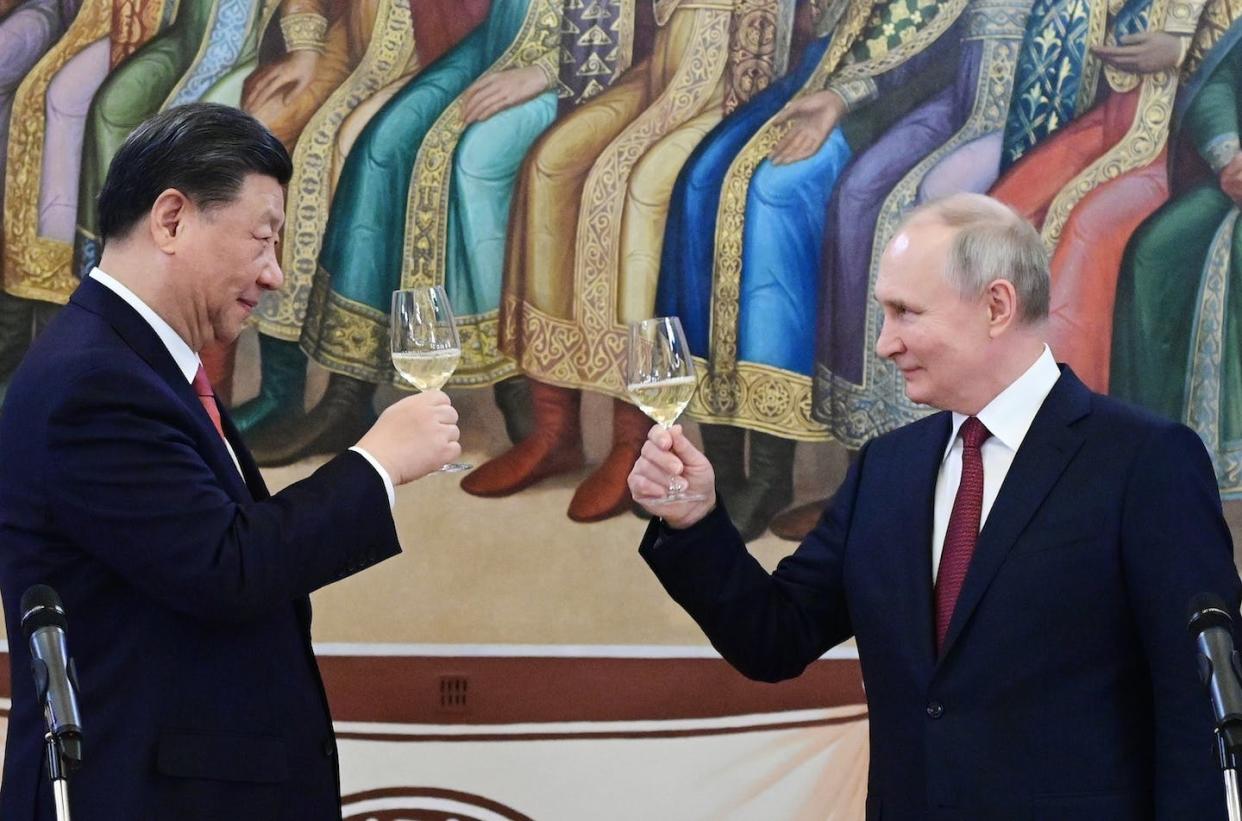4 ways to rein in China and Russia, alleged superpower perpetrators of atrocity crimes

At the latest meeting in South Africa of BRICS — a grouping of the world economies of Brazil, Russia, India, China and South Africa — Russian President Vladimir Putin was a no-show.
Because the International Criminal Court issued an arrest warrant for him earlier this year over atrocity crimes allegedly committed against Ukrainian children, Moscow was apparently concerned Putin might actually be taken into custody if he travelled to Johannesburg.
Mass atrocity crimes include genocide, crimes against humanity, ethnic cleansing and war crimes. Amid the challenges facing the world today, the urgency of preventing mass atrocity crimes has taken centre stage.
In 2023, we’re grappling with an unprecedented number of forcibly displaced people — more than 100 million — in part due to a surge exacerbated by Russia’s invasion of Ukraine.
Progress stagnating
While there has been some success in efforts to curb these human rights abuses, such as the introduction of the United Nations’ Responsibility to Protect doctrine and the creation of the International Criminal Court, recent developments have raised concerns that progress has not only stagnated but regressed.
Particularly troubling is the spectacle of two UN Security Council members — China and Russia — that stand accused of perpetrating mass atrocity crimes.
China has grown increasingly bellicose and aggressive, threatening its neighbours and persecuting minorities within its borders. Beijing’s actions against its Uyghur Muslim population have sparked global outrage, with allegations of genocide, forced labour, mass detentions, cultural repression and destruction of mosques.
Similarly, Russia’s ongoing invasion of Ukraine has raised grave concerns about human rights abuses. Many scholars and experts are labelling Russia’s war as being genocidal in intent given its massacre of civilians in Ukrainian towns such as Bucha, widespread cases of torture that were confirmed by the United Nations and ongoing attempts that seem aimed at destroying Ukraine’s culture.

China, Russia ties
The emerging alliance between authoritarian China and Russia is a grave cause for concern. During Chinese President Xi Jinping’s recent trip to Moscow, he told Putin:
“Now there are changes that haven’t happened in 100 years. When we are together, we drive these changes.”
A future global order shaped and led by these two autocrats gives a new ominous meaning to English novelist George Orwell’s famous quote: “If you want a picture of the future, imagine a boot stamping on a human face — forever.”
As Putin and Xi work to transform the international order, every country should contemplate the grave threat this could pose to human rights, democratic norms and the very essence of the UN Charter, especially with regards to acts of aggression.
The disconcerting reality of great power perpetrators is a disheartening testament to the erosion of the global commitment to prevent such horrors.
The current situation underscores the dire need to rekindle the flames of progress and ensure that human rights norms and institutions are not abandoned.
The onus lies on the international community to reassert its commitment to preventing mass atrocities, regardless of the culprits’ geopolitical stature and economic power. To achieve this, four fundamental pillars must be pursued.
Four ways to uphold global human rights
Awareness and education must be disseminated to amplify the voices of those allegedly targeted by Russia and China. An informed populace can apply pressure on their governments to uphold human rights and hold perpetrators accountable. They can also demand companies stop doing business with both countries until their behaviours and policies change. Both Moscow and Beijing are going to great lengths to spread propaganda and disinformation by targeting global audiences.
Diplomatic initiatives must be pursued to ensure that economic interests don’t eclipse the need to prevent mass atrocities. Countries must band together to circumvent and counter Moscow and Beijing’s plans to achieve global hegemony that will be a death knell for human rights and democracy.
Strengthening the mechanisms of justice is paramount. The International Criminal Court must be empowered to investigate and prosecute all perpetrators, regardless of their positions of power. This includes exploring avenues for the court to use even when faced with sanctions and threats.
Countries must continue to uphold Article 51 of the UN Charter — “the inherent right of individual or collective self-defence if an armed attack occurs against a Member of the United Nations” — and support Ukraine in its efforts to stop Russia’s genocidal invasion. False claims of peace talks mask Russia’s intention to recolonize Ukraine, which will only be achieved through mass violence and the destruction of Ukrainian identity. This will also send a message to Beijing that its role in helping Russia invade Ukraine, to say nothing about a prospective Chinese attack on Taiwan, will come with consequences.
Read more: Nancy Pelosi’s visit to Taiwan causes an ongoing Chinese tantrum in the Taiwan Strait
The international community must acknowledge that the era of great power nations perpetrating atrocity crimes is upon us and that it poses a real threat to global peace and security.
Countries that commit genocide within and outside their borders — not to mention imprisoning journalists, political opposition leaders and civil society groups — are a danger to humanity.
When they are permanent members of the UN Security Council and working together in unison, they represent a totalitarian threat that cannot be ignored.
This article is republished from The Conversation, an independent nonprofit news site dedicated to sharing ideas from academic experts. If you found it interesting, you could subscribe to our weekly newsletter.
It was written by: Kyle Matthews, Concordia University.
Read more:
Kyle Matthews has received funding from the Government of Canada (Department of Canadian Heritage) and the Konrad Adenauer Stiftung. He is affiliated with the Canadian Global Affairs Institute, the Canadian International Council and the BMW Foundation.


